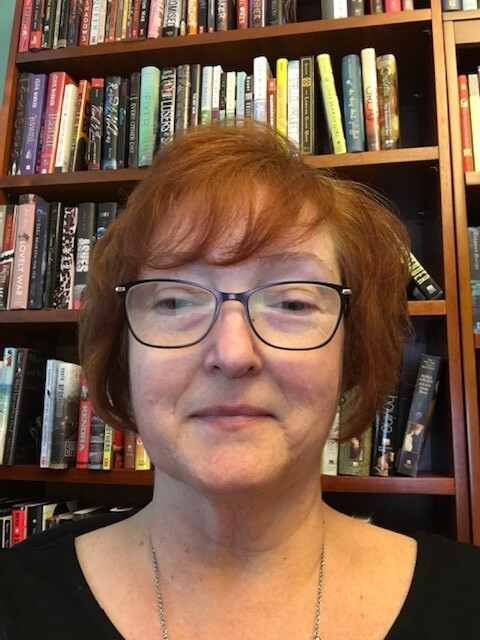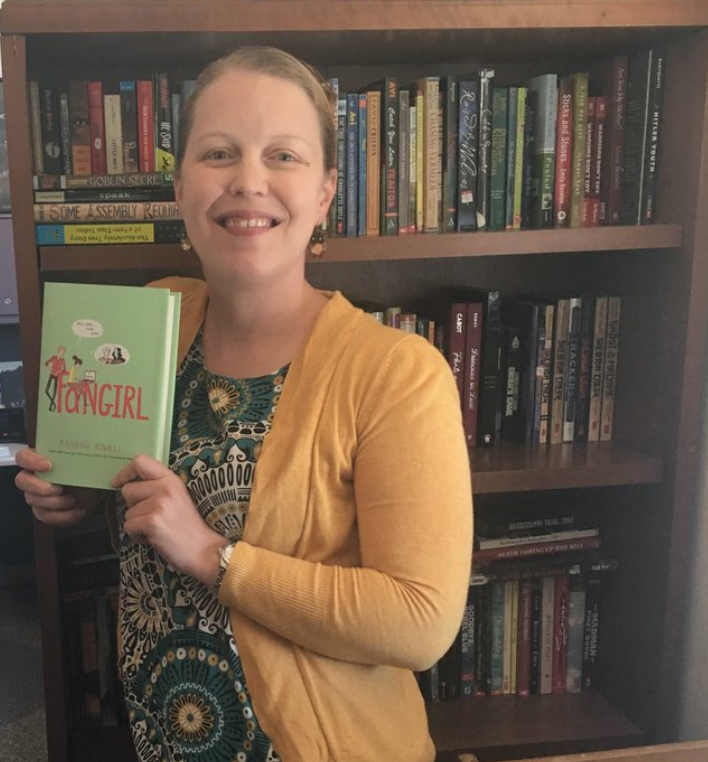This statement spurred a discussion about how parent-child and family relationships are portrayed in the books we had read. “Yea she was way worse than Xio’s mom” (The Poet X) another chimed in. “Darius’s dad was alright, he just didn’t understand him. Neither did his grandfather.” (Darius the Great is Not Okay) added another student. In this impromptu reflection, we recognized a pattern and found that family dynamics played a role in the plot development.
Over the course of spring semester, the preservice teachers in my young adult literature course read 11 novels that represented a variety of genres, formats and experiences (e.g., verse novels, graphic novels, banned books, classic YA texts, LGBTQ+ representation, body image, to name a few). In these books we found a spectrum of experiences; we saw teens wanting more independence, close relationships with grandparents, parents who misunderstood their children, cultural and religious differences between family members, the loss of parents, verbal and emotional abuse, the effect of drug abuse and sexual assault on a family, and the idea of a chosen family.
Although not all of the experiences included in young adult literature are picture perfect, many of them reflect the experience students in our K-12 students face at home. And for that reason my preservice teachers concluded that all of these portrayals of family dynamics (healthy or not) are an important for adolescents to read. Not only does reading about these experiences provide a possible mentor for how to deal with similar situations, but they also show that life can be messy and not easily fixed within 200 or so pages. In some of these the texts we read, the main characters found healing or understanding with their family members, while in others were still a work in progress at the end of the book.
In this blog post, my preservice teachers offer ways to hold space for discussion surrounding family dynamics using a few of their favorite texts from the course.
The Outsiders by S.E. Hinton
by Shannon & Annabelle
Summary of Text: Published in 1967, The Outsiders has become a classic young adult work of fiction. Centering on a group of boys called the “greasers” who have become a chosen family and their rival gang, the “Socs” are rich kids from the West side of town, providing them with endless privilege. After the death of a Soc at the hands of a greaser, the divide between the two groups becomes evident.
Using the text to think about family dynamics: The Outsiders is a novel that has been used in the classroom for decades, with hard-hitting concepts such as the cycle of violence and the reimagined family connection. The Greasers are young men forced to grow up in the absence of parents. With the knowledge and experience of a sixteen-year-old and the responsibilities of an adult, they each work to find their own path, and some struggle to make it out alive.
The following discussion questions can be used to discuss the idea a “chosen family” and family dynamics with students:
- How does the reader gain an understanding of the Greasers relationships with their parents throughout the novel?
- Although there aren’t many interactions between the children and their parents in the story, what kind of relationships may readers assume the Greasers have with their parents?
- How does Darry take on a parental role for both Ponyboy and Sodapop? and maybe even Johnny.
- What about the relationship between the Greasers resembles a family connection?
- What do you notice about the family relationships within the Socs?
- What do we see happening to Darry when he takes on the role of a parental figure to the younger Greasers?
- What would happen if Darry and Dally switched positions and Dally was forced to take on the role of a caretaker?
- In the moment of Johnny's death, how do we see the Greasers come together and unite as a family?
Additionally, students could consider family dynamics present in The Outsiders through the following writing prompts:
- Consider the dynamics between brothers Darry, Sodapop, and Ponyboy and how they would be altered if their parents were alive and written into the novel.
- Would the presence of parents (both Johnny and Ponyboy) alter the lives of the Greasers and the level of freedom they possess?
- What differences do we see between the older Greasers, Dally and Darry, and how do they impact the lives of the younger boys?
By Hailey & Karoline
Summary of text: In the graphic novel Swim Team by Johnnie Christmas, the main character Bree is excited for her first day at her new middle school, Enith Brigitha… that is until she is finds out Swim 101 is the only elective which fits into her schedule. Just thinking about swimming freaks her, but thanks to her elderly neighbor and former swim team captain, Bree is able to fall in love with swimming and might be able to transform the failing school’s swim team into winners.
Using the text to think about family dynamics: When considering the relationship between Bree and her father, the idea of parents placing their fears onto their children is present. Bree’s father has had a long-standing fear of drowning, a fear that has been transferred to Bree. fears. Unlike her father, however, Bree had support from a role model to rid herself of the fear and grow to love swimming. We suggest holding a socratic seminar to discuss this theme, using the questions below. Students should be provided with the questions before hand so they can start their own ideas and be ready to expand on the discussion questions. Ask students to create their own follow-up questions to ask their classmates. Students will read Swim Team and have the opportunity to create socratic seminar questions to ask the following class. Provide the students with questions to start their own ideas and the theme of family dynamics and fears of parents embedding in their children. The students will be told they are to expand and ask followup questions.
Leading Discussion Questions:
- How did Bree’s father’s fears show up in Bree?
- Why was Etta’s attempt to alleviate Bree’s fears successful?
- Why or why not would her father’s attempts to learn to swim help Bree?
By Gigi and Margaret
Summary of Text: Are You There God? It’s Me, Margaret (1970) by Judy Blume is a book about eleven-year-old Margaret, who is grappling with the challenges of adolescent life. After moving over the summer, Margaret has to figure out how she can fit in at her new school. She becomes friends with Nancy, a girl who knows a lot about puberty and is much more outgoing than Margaret. In her home life, Margaret is figuring out if she should be a part of a religion because everyone but her parents belong to a religion. Throughout the novel, Margaret explores all these questions about her beliefs, herself, and her place in the world.
Using the text to think about family dynamics: Through the course of the novel, Margaret’s relationships with her family is present; embarrassment of talking about puberty with her parents, her close relationship with her paternal grandmother, as well as her non-existent relationship with her mother’s parents. Students can discuss these ideas through a whole class or group discussion using the following questions:
Questions related to Margaret’s paternal grandmother:
- Do you think Margaret has a better relationship with her grandmother than her parents?
- What characteristics does her grandmother have that help Margaret confide in her so much?
- What differences do you see between the relationship Margaret has with her parents and the relationship with her grandmother?
- Does Margaret have a better relationship with her grandmother or her parents?
- Does the relationship between Margaret and her grandmother change throughout the novel?
Questions related to religion:
- What does Margaret learn about religion in her family?
- How do her parents' conflicted views about religion affect Margaret’s relationship with her parents?
- How do her parents' views about religion affect Margaret’s faith?
- Do you think Margaret should have the choice of religion?
- What is Margaret’s experience with religion as she goes to different churches with her grandmother and friends?
- What does Margaret learn about other religions?
- Why do you think Margaret talks to God? Is she seeking comfort? Someone that she can confide in?
- How does Margaret confide in God during her experiences with adolescence?
Questions related to Margaret’s mom and her parents:
- How do you think Margaret feels about her grandmother's argument over religion?
- Should Margaret's grandmother have a say in which religion Margaret chose?
- Are Margaret’s parents too lenient where her grandmother has to step in?
- Why is choosing a religion important to Margaret’s grandparents?
Questions related to Margaret and her parents:
- What are the dynamics between Margaret and her parents?
- How do Margaret’s parents support her during any of her struggles with adolescence?
- What are some moments in which Margaret’s parents support her? Moments where they did not support her?
- Would Margaret’s life be different if her parents decided to practice one religion?
- Does Margaret’s relationship with her parents evolve throughout the novel?
By Morgan and John
Summary of the text: The Poet X is a story of Xiomara told by her through verse. Xiomara is a strong young Dominican girl who is constantly standing up for herself and her twin brother in Harlem, New York. Even though Xiomara is strong, it is almost impossible for her to have the strength to go against her mother's strict rules that she has placed mainly on Xiomara. Through her own narration in various styles of poems, Xiomara tells her side of growing pains with the desire for the opposite sex, a maturing body, and resistance against her mother's Catholic views. Through the poems, the reader is shown the enormous talent that Xiomara has for creative writing and spoken word, to the point where the reader almost begs for her to join the poetry club in order to let her voice be heard.
Using the text to think about family dynamics: The Poet X allows students to make real, sometimes tough, connections with their own family dynamics. Articles like Jeremy Engle’s “Do You Push Your Parents’ Buttons?” offered by The New York Times provides an almost informational approach. Pairing this article with The Poet X, the following instructional approaches can be used:
- Have the students anonymously answer the reflection questions included at the end of the article in a Padlet or Jamboard (e.g. “What do you wish your parents would understand about your behavior”; “Do you ever push your parents’ buttons?”; “Why do you think your behavior got under your parents’ skin?”); here we give students the opportunity to explore their own emotions without necessarily connecting it to our verse novel.
- ) Engage in a Socratic Seminar, where students have the opportunity to make explicit connections between some of Engle’s thoughts on parent-child dynamics and the mild “dumpster-fire” that is Xiomara and her mother’s relationship
Laura Jacobs is an assistant professor of English Education at Towson University in Towson, MD. Dr. Jacobs teaches Secondary English Methods and Young Adult Literature as well as works with student teachers in the field. Her (current) favorite young adult book is The Firekeeper’s Daughter by Angeline Boulley.
Karoline Aldrich is a Secondary English Education major at Towson University and hopes to teach high school English. Her favorite young adult book is The Lighting Thief.
Shannon Coggins is a Secondary English Special Education major at Towson University and hopes to one day teach middle school inclusive or self-contained ELA. Her favorite young adult book is Paper Towns by John Green.
Margaret Mendez is a Secondary English Education major at Towson University and hopes to teach high school English. Her favorite young adult book is Before We Were Free by Julia Alvarez.
Hailey Quinlin is a Secondary English Education major at Towson University and hopes to teach high school English. Her favorite young adult book is We Were Liars by E. Lockhart
Annabelle Small is a Secondary English Special Education at Towson University and hopes to one day teach Middle School Functional Academic Learning. Her favorite young adult book is Bright Burning Stars by A.K. Small
John Smith is a Secondary English Education major at Towson University and hopes to teach high school English. His favorite young adult book is When You Reach Me by Rebecca Stead.
Morgan Trivers is a Secondary English Education major at Towson University and hopes to teach high school English.
Gigi Win is a Secondary English Education major at Towson University and hopes to one day teach secondary English.




 RSS Feed
RSS Feed